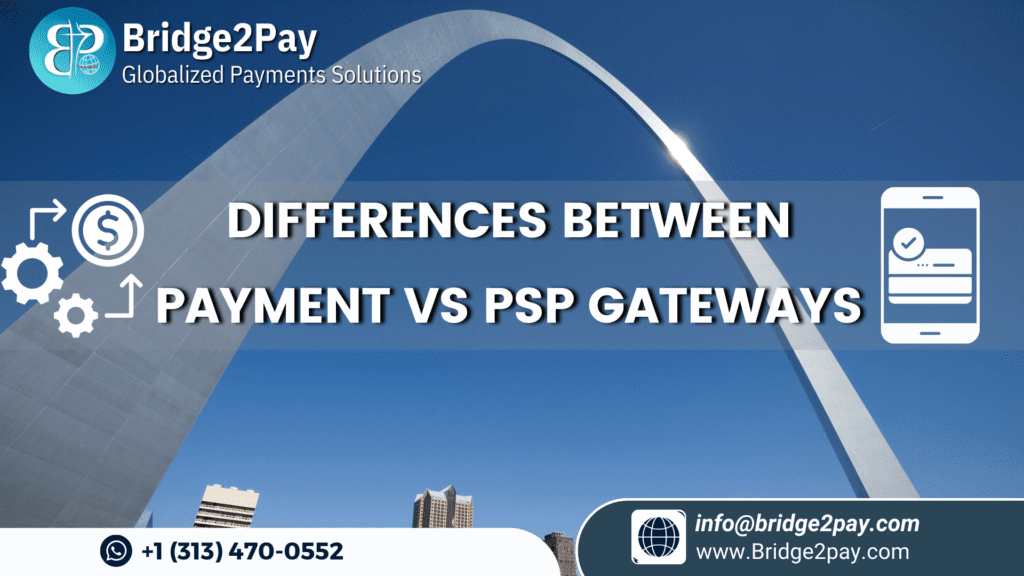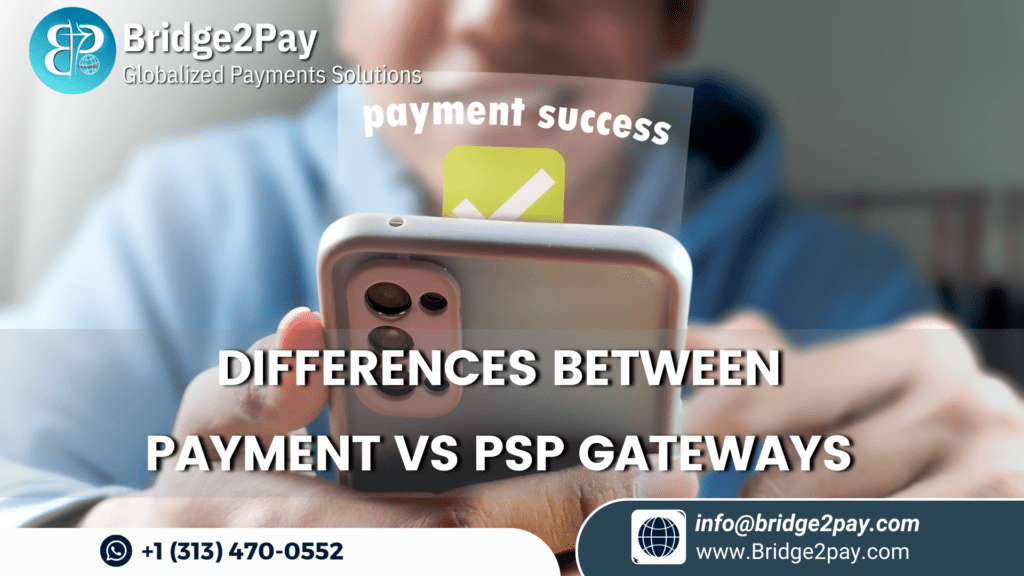Differences Between Payment and PSP Gateways

Bridge2Pay will explain – Payment and PSP Gateways – Online payments have become a crucial aspect of our daily life in the current digital era. You’ve probably used payment gateways and payment service provider (PSP) gateways when making an online purchase, signing up for a service, or donating. Although both are essential for facilitating online transactions, they have different purposes and are frequently utilized in various situations. We will thoroughly examine the distinctions between payment gateways and PSP gateways in this blog post, illuminating their functions, roles, and effects on online commerce.
1. Introduction: Payment and PSP Gateways
The way we do transactions has been changed by online payments. Our connected world has become dependent on the capacity to make payments online, whether through e-commerce websites, mobile apps, or subscription services. Complex systems like payment gateways and PSP gateways support this digital payment landscape.
2. Payment Gateways: A Closer Look – Payment and PSP Gateways
How Payment Gateways Work
A payment gateway is a piece of software that allows for the secure transmission of payment information between a merchant (seller) and the acquiring bank, enabling the authorization of payment transactions. It is essential for processing credit card and debit card payments as well as those made through other electronic payment systems including digital wallets and ACH (Automated Clearing House) transfers.
Key Features of Payment Gateways
- Transaction Processing: Payment gateways’ main goal is to process transactions by transmitting, validating, and authorizing consumer payment information securely.
- Merchant Account Management: Business entities can monitor transaction history and reconcile payments using the tools they provide for managing merchant accounts.
- Payment Methods: A number of payment methods, including credit cards, debit cards, and different digital wallets, are supported via payment gateways.
- User Experience: A fundamental component of payment gateways is to provide the end user with a seamless and secure payment experience.
3. PSP Gateways: Unlocking their Role -Payment and PSP Gateways
The Role of Payment Service Providers
Payment Service Providers (PSPs) are companies that provide a wider range of online payment-related services. They frequently serve as a bridge between businesses and financial institutions, offering a centralized platform for controlling several facets of internet transactions.
Key Functions of PSP Gateways
- Transaction Processing: Although PSP gateways offer extra features outside the purview of payment gateways, transaction processing is a component of their service.
- Merchant Account Management: In a manner comparable to payment gateways, they offer solutions for managing merchant accounts.
- Payment Methods: Just like payment gateways, PSP gateways accept a variety of payments.
- User Experience: PSPs frequently put a strong emphasis on improving the overall user experience by providing options like customizable checkout and support for many languages and currencies.
4. Differences Between Payment and PSP Gateways (Elaborated) -Payment and PSP Gateways
Payment Gateways: Payment gateways are experts in processing transactions quickly and securely. They are designed to be as efficient as possible, with the main goal being to make the payment process easier. Through payment gateways, a merchant’s website or application can have a direct connection to the acquiring bank, which handles the authorization, processing, and completion of cardholder data.
PSP Gateways: PSP gateways execute transactions as well, but they frequently provide extra features not found in conventional payment gateways. PSPs should include more sophisticated reporting, analytics, and fraud prevention techniques in their transaction management services. They want to give businesses a wider range of tools so they can efficiently handle their online transactions.
Merchant Account Management
Payment Gateways: Payment gateways provide fundamental tools for managing merchant accounts. They often concentrate on transaction history, giving businesses an easy method to manage payments, analyse transaction information, and balance their books.
PSP Gateways: PSP gateways frequently offer more advanced merchant account administration features. They offer capabilities like subscription management, recurring billing choices, and customer database administration in addition to simple transaction tracking. Businesses with complicated invoicing processes and subscription models may find these features to be very useful.
Payment Methods -Payment and PSP Gateways
Payment Gateways: Payment gateways are mostly concerned with conventional payment methods, mainly credit and debit cards. Although they might also allow e-wallets like PayPal and ACH transfers, processing card payments is their primary job.
PSP Gateways: PSPs often provide a wider selection of payment options. They frequently have connections to a worldwide network of financial institutions, allowing them to offer customized payment choices in different nations. For organizations looking to grow abroad and satisfy the various payment preferences of customers around the world, this capability is crucial.
User Experience – Payment and PSP Gateways
Payment Gateways: Payment gateways’ major attention is on the transaction process itself, despite the fact that providing a safe payment experience is a core element of these systems. They might only provide a few options for personalizing the user interface and the transaction procedure.
PSP Gateways: PSPs spend more money on improving the whole user experience. They frequently include choices for currency conversion, configurable checkout pages, and support for several languages. These elements help create a smooth and user-friendly payment procedure, which may be especially helpful for companies that place a high value on branding and customer experience.
5. Choosing the Right Solution for Your Business -Payment and PSP Gateways
Selecting the right payment solution for your business depends on several factors:
Payment Gateways: Payment gateways are perfect for companies that have simple payment processing requirements, including online sales of goods or services. Small to medium-sized organizations that don’t need the sophisticated capabilities and customization choices offered by PSPs should find them particularly suited. Payment gateways provide a quick and effective solution to manage secure card transactions.
PSP Gateways: PSP gateways are ideal for companies with more intricate payment needs. This comprises corporations that use subscription business models, enterprises with a global clientele, and organizations that prioritize improving the customer experience. PSPs give businesses a wider range of tools and capabilities, enabling them to customize their payment procedures to meet particular demands and client preferences.
In the decision-making process, it’s crucial to consider the specific goals and needs of your business, your target audience, and the level of customization and features required to provide a seamless and secure payment experience for your customers.
6. Security and Compliance – Payment and PSP Gateways
Both payment gateways and PSP gateways must prioritize security and compliance to ensure the protection of sensitive customer data and meet legal requirements.
PCI DSS: Payment Card Industry Data Security Standard – In order to guarantee that businesses handling credit card information maintain a secure environment, PCI DSS is a set of security requirements. Both payment and PSP gateways must adhere to PCI DSS in order to protect sensitive customer data and uphold credibility. To achieve and maintain PCI DSS compliance, they must employ strong security measures, such as data encryption, access controls, and frequent security assessments.
To safeguard the information of your clients and maintain a secure payment process, it is crucial to make sure that your selected payment solution conforms with these criteria.

7. Integration and Customization
The ease of integration and level of customization are critical factors when selecting a payment solution:
Integration: Options for smooth integration with different e-commerce platforms, content management systems, shopping carts, and mobile apps should be provided by payment gateways and PSP gateways alike. A seamless and effective payment process depends on your ability to integrate your payment solution to your current technology stack.
Customization: PSP gateways frequently provide more in-depth customisation options. They enable companies to customize the user experience to fit their website or mobile application, brand the payment process, and even provide a variety of language and currency choices. The degree of customisation during the payment process can have a big impact on the overall user experience and brand consistency.
8. The Future of Online Payments
The future of online payments is marked by constant innovation and evolution:
Emerging Technologies: Blockchain, cryptocurrency, and mobile payment methods are examples of technologies that are continuing to gain popularity. For payment gateways and PSP gateways, these advancements bring with them both new obstacles and opportunity. Payment systems must change to accommodate these new technologies and give businesses the resources they need to accept these new payment methods.
Global Expansion: Payment methods must change as firms cross international borders in order to comply with regional payment legislation and preferences. The capacity to serve a worldwide consumer base and provide localized payment options is a crucial factor for the future.
Regulation and Compliance: Regulations governing internet payments are constantly changing. To ensure that businesses can operate legally and safely, payment systems must always be updated and compatible with changing rules in various countries.
9. Conclusion: Harnessing the Power of Payment Solutions
In conclusion, organizations looking to succeed in the world of digital commerce must fully comprehend the distinctions between payment gateways and PSP gateways. Payment gateways are companies that focus on processing transactions in a safe and effective manner. On the other hand, PSP gateways provide a wider range of services, frequently emphasizing user experience and personalization.
The decision between the two is based on the particular requirements and objectives of your company, as well as factors like security, compliance, and the constantly changing online payment environment. No matter which routes you take, utilizing the potential of various payment options is crucial for success in the digital age.
Making the proper payment solution choice can have a big impact on your ability to offer clients a seamless, secure, and user-friendly payment experience, which will ultimately help your company expand and succeed in the digital age.